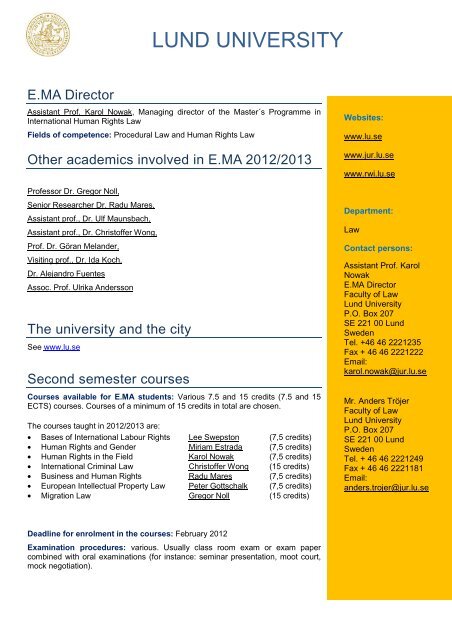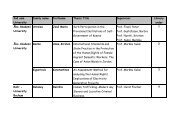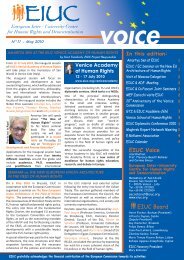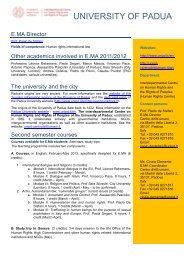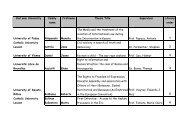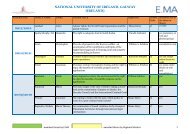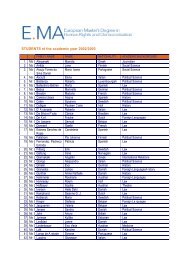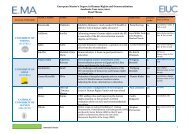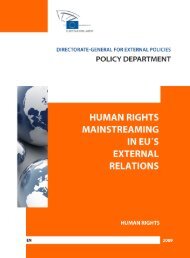You also want an ePaper? Increase the reach of your titles
YUMPU automatically turns print PDFs into web optimized ePapers that Google loves.
E.MA Director<br />
<strong>LUND</strong> <strong>UNIVERSITY</strong><br />
Assistant Prof. Karol Nowak, Managing director of the Master´s Programme in<br />
International Human Rights Law<br />
Fields of competence: Procedural Law and Human Rights Law<br />
Other academics involved in E.MA 2012/2013<br />
Professor Dr. Gregor Noll,<br />
Senior Researcher Dr. Radu Mares,<br />
Assistant prof., Dr. Ulf Maunsbach,<br />
Assistant prof., Dr. Christoffer Wong,<br />
Prof. Dr. Göran Melander,<br />
Visiting prof., Dr. Ida Koch.<br />
Dr. Alejandro Fuentes<br />
Assoc. Prof. Ulrika Andersson<br />
The university and the city<br />
See www.lu.se<br />
Second semester courses<br />
Courses available for E.MA students: Various 7.5 and 15 credits (7.5 and 15<br />
ECTS) courses. Courses of a minimum of 15 credits in total are chosen.<br />
The courses taught in 2012/2013 are:<br />
• Bases of International Labour Rights Lee Swepston (7,5 credits)<br />
• Human Rights and Gender Miriam Estrada (7,5 credits)<br />
• Human Rights in the Field Karol Nowak (7,5 credits)<br />
• International Criminal Law Christoffer Wong (15 credits)<br />
• Business and Human Rights Radu Mares (7,5 credits)<br />
• European Intellectual Property Law Peter Gottschalk (7,5 credits)<br />
• Migration Law Gregor Noll (15 credits)<br />
Deadline for enrolment in the courses: February 2012<br />
Examination procedures: various. Usually class room exam or exam paper<br />
combined with oral examinations (for instance: seminar presentation, moot court,<br />
mock negotiation).<br />
Websites:<br />
www.lu.se<br />
www.jur.lu.se<br />
www.rwi.lu.se<br />
Department:<br />
Law<br />
Contact persons:<br />
Assistant Prof. Karol<br />
Nowak<br />
E.MA Director<br />
Faculty of Law<br />
Lund University<br />
P.O. Box 207<br />
SE 221 00 Lund<br />
Sweden<br />
Tel. +46 46 2221235<br />
Fax + 46 46 2221222<br />
Email:<br />
karol.nowak@jur.lu.se<br />
Mr. Anders Tröjer<br />
Faculty of Law<br />
Lund University<br />
P.O. Box 207<br />
SE 221 00 Lund<br />
Sweden<br />
Tel. + 46 46 2221249<br />
Fax + 46 46 2221181<br />
Email:<br />
anders.trojer@jur.lu.se
Thesis<br />
Research areas:<br />
• Human Rights Law<br />
Thesis supervision: See list of possible supervisors above.<br />
Number of copies to hand in at the hosting university (+ 2 copies to the E.MA Secretariat): 2<br />
Library<br />
Faculty of Law Library and Raoul Wallenberg Institute Library, specialized in human rights literature.<br />
Contacts with NGOs and/or IGOs<br />
Please see www.rwi.lu.se/institute/aboutrwi.shtml<br />
Administration and logistics<br />
Information concerning visa arrangements:<br />
Entry Visa: A visa is a permit required by persons wishing to enter Sweden for a temporary visit, or simply when<br />
passing through in transit. In Sweden, entry visas follow the rules set forth by the Schengen agreement.<br />
If you are not a citizen of a Schengen country, you may need a visa to enter the Schengen zone. Such visas are<br />
usually valid in all Schengen countries and entitle the bearer to travel freely between them until the visa expires.<br />
However, since rules vary from country to country in Europe, please obtain relevant information from the<br />
Swedish Embassy/Consulate in your home country before going to Sweden.<br />
Despite the fact that control of individuals has been abolished at the frontiers between the Schengen countries,<br />
everyone should bring documentation proving their nationality when travelling in the Schengen zone. People<br />
from countries outside the EU must be able to show a valid passport. If you are required to have a visa, you<br />
must be able to show a valid visa or residence permit.<br />
To obtain a visa you need to apply for it immediately after you have received your Letter of Acceptance at an<br />
embassy or consulate in your country. When applying for a visa you need a valid passport, a "Letter of<br />
Acceptance", certification of financial support and health insurance coverage. The general rule is that you apply<br />
for a visa at the embassy/consulate of the country you mainly intend to visit. The process may take up to two<br />
months, so please apply in good time.<br />
Foreign citizens with a residence permit in a Schengen country may also travel freely in the zone for a total<br />
period of three months. This means, for instance, that a foreign citizen living in Sweden may visit friends living in<br />
another Schengen country without first having to apply for a visa. (Information available on www.lu.se)<br />
You can also contact the International Program Coordinator/Course Administrator Anders Tröjer (see list of<br />
contact persons).<br />
IT and logistics: Access to Faculty of Law IT equipment during library opening hours (8-20) and Raoul<br />
Wallenberg Institute IT equipment at all times with personal access card.


